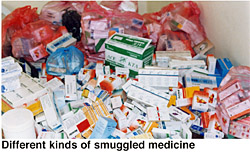
Playing Havoc With Economy [Archives:2001/10/Business & Economy]
March 5 2001
Smuggling goods enter Yemen through 95 land and sea approaches and are marketed in about 25 markets. Out of YRs 854 billion, the total public expenditure, YRs 396 billion is spent on smuggled goods. This figure, as well as the relatively low prices of these goods affect the national economy and investors’ competition in the market.
Volume of the Problem
According to official statistics, customs revenue decreases from YRs 30 billion 29 million in 1998 to 28 billion 715 million in 1999 owing to illegal entrance of goods into the country. Smuggling has become an economical sector parallel to the industrial and commercial one.
Despite the government’s efforts to free foreign trade, smuggling is still there causing a retreat in the national exports of non-oil products. For example, in 1999, foreign trade reached an amount of YRs 692.8 billion. However, its rate to the GDP fell from 68.2% in 1997 to 2.5% in 1999. Indicators show that Yemen’s share of non-oil exports show an imbalance between exports and imports, whether legal or illegal.
A report by the Customs Authority in 1998, showed the country’s loss of YRs 33,759,000,000 as a result of smuggling and tax evasion.
Dr. Ali Al-Adeemi of the Supreme Council of Export Promotion, in a study highlighted the impacts of smuggling on national industrial and agricultural exports saying that smuggling has led to imbalance exports, in spite of the efforts exerted to promote national income resources. Al-Adeemi added that smuggling the national products to countries of the African Horn has damaged the reputation of Yemeni industry because, owing to bad transportation, they arrive to markets in bad condition. For example, among 1000 water bottles only 3-4 are in good condition, whereas the rest are damaged.
Smuggling of Medicine

Despite the fact that the annual amount of Medicine provided by the Medicine Fund-$10 million, Al-Thawrah Hospital-$ 3,200 million, Military hospitals-$4 million, private sector-$80 million and the national industry which provides medicine of $4,644 each year smuggling of medicine is increasing imposing a real threat on people’s health.
Sources estimate cost of the annual smuggled medicine at $10 million. These include expired antibiotics, vaccinations, etc. most of come from Djibouti.
Insecticides and Sick Fruits
Smugglers also brought fruits, seeds, plants, etc. into the country. All these are not subject to tests or custom tariff and are among the main reasons of spread of diseases among plants and trees.
Smuggling and the national industry.
The Yemeni Industrialists Society emphasize that spread of smuggling scale, absence of standardization, low prices of smuggled goods, high consumption and excise tax have affected the national industry. As a result 45 factories were closed down and more than 5000 employees were fired.
The National Tobacco and Matches Company estimates its loss at more than billion rials each year due to smuggling many kinds of cigarettes into the country.
All this indicates that continuation of smuggling practices affect the national economy and industry. Protection of economy and enhancement of Yemen’s commercial balance will not be achieved as long as smuggling is on the rise.
——
[archive-e:10-v:2001-y:2001-d:2001-03-05-p:./2001/iss10/b&e.htm]


